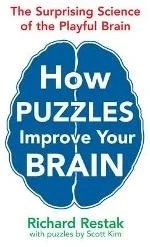How Puzzles Improve Your Brain by Richard Restak with puzzles by Scott Kim (book review).
Mix neurologist Richard Restak and puzzle-maker Scott Kim and you’ve got the makings of explaining how exercising your brain is good for you. ‘How Puzzles Improve Your Brain’, as explained in their introduction, not only gives you various puzzles to explore but also what part of the brain you’re training or, as I discovered, where my natural talents lie. You can also be humbled in the introduction by discovering your own weaknesses, although I think with one of the puzzles, you really do need to know your words to have gotten the answers.
Unless you want to write in this book, I do suggest you keep a notepad close by and give yourself plenty of time to work out the problems to get the full benefit. Saying that, there is plenty of text as Restak guides you through thinking on what kind of memory you have or employ in certain situations. I have to confess that other than creating a mnemonic to remember the electrochemical series by their chemical letters sing-song when I was at college, I find it more of a bind to remember a number of words for something when it’s easier to remember a single word, although that might just be me.
One of the things about writing reviews is that I read about a hundred pages a day and then put what I’ve learnt into a growing written review than rely on memory alone to write after reading the entire book. As such, a lot of this book gets tagged that way than in long term memory. Considering that reading over a dozen books a month, that can only be the way I work when most of you out there read in moderation comparatively longer time. Saying that, I even surprise myself by drawing up obscure facts from books I read a few years back so obviously a lot of it also sinks into my head.
I have to apply this book to how my memory works as examples here but I am sure that you who read this book will no doubt find the clues to how your own memory works. I’ve also discovered that my visual memory is also quite sharp but then, I still draw or paint from time to time so observation is just a natural reflex. As Restak points out, the more you exercise your brain, the stronger your memory become and Scott Kim’s puzzles will make you think, even if I’m still picking out the ‘B’s at the bottom of the pages here. However, it’s a shame that some of the examples are so American when it would have been possible to have chosen more British examples for this book’s release over here. I mean, I doubt if many of us would know what the symbol of ‘General Mills’ is, let alone know who they are, let alone how many sides the US ‘Stop’ signpost has unless you draw up the memory from the ‘Close Encounters Of The Third Kind’ film scene. The British stop sign is actually mostly circular for those on the other side of the pond.
The spatial manipulation tests just reaffirmed my own artistic ability in quickly seeing everything in terms of cubes, pyramids and spheres. Not sure if I would include prisms in this because they are really composites of squares and triangles.
Several of the tests, like mirror co-ordination, which is following your finger in a maze in a mirror as opposed to hanging a mirror on a wall showed just how well co-ordinated I am and probably explains part of my keyboard typing skills and speed. Reassurances like that do remarkably well for the self-esteem.
I also scored heavily in lateral thinking exercises but I suspect that was mostly because that’s how I think anyway. I do agree with the authors that such skills can only get better the more you practice them. After reading this book, you’ll find a weakness that you want to strengthen then find them exercises you can do daily so you can get them up to speed. I did find that some of the tests at the end of the book, like the Monty Hall problem, is something that I’ve come across before and find more of these were just a test of how good my memory was.
The more you read this book, the more you’ll become aware of the different memory aspects you have. Knowing what your strengths and weaknesses are with these, not to mention how to exercise them, should enhance your own memory. Mind you, I still have several words from the first test hanging around in my own head now and I do wonder if Restak has any ideas for making me forget them. No doubt my moving onto the next book will quickly finish that off now.
Restak says he and Scott Kim hope to do more books on this subject. If this is just an example, then I’d be all for it. There’s a lot of diverse subjects that need to be explored and tested here and I’d love to see them comment on foods that are good for the brain. We all, I hope, exercise our brains in doing various games like crosswords and Sudoku daily, so knowing how they can influence your other memory skills and thinking processes should make you pay more attention to your grey matter. Treating everything you do as a game, including work tastks, even if it means playing against yourself which I often do, I found keeps you alert and never lets anything get mundane. Read and learn.
GF Willmetts
March 2013
(pub: Souvenir Press. 294 page illustrated indexed small enlarged paperback. Price: £12.99 (UK). ISBN: 978-0-28564-175-4)
check out websites: www.souvenirpress.co.uk, www.richardrestak.com, www.theplayfulbrain.com and www.scottkim.com

